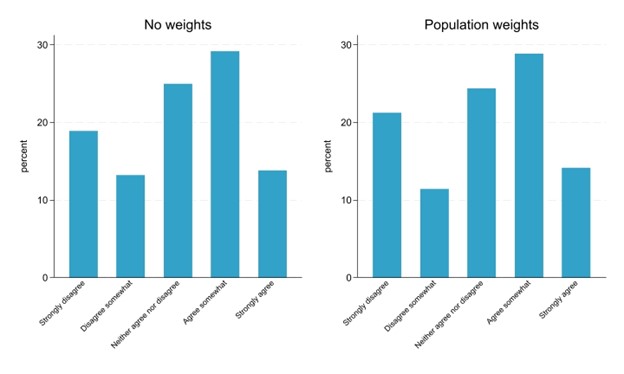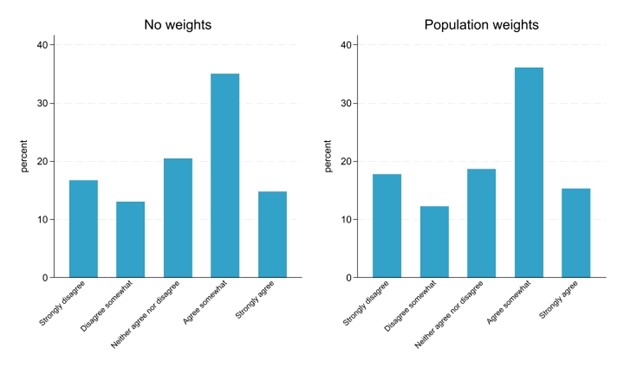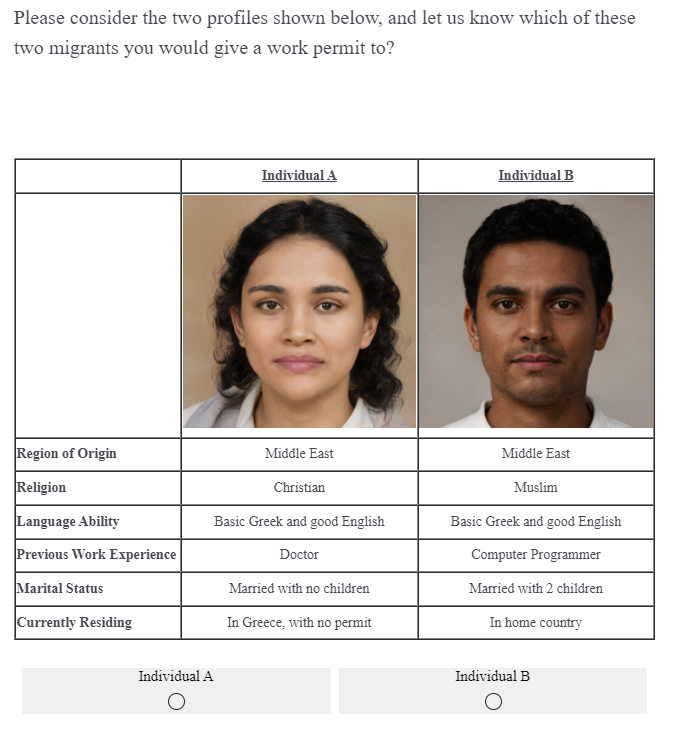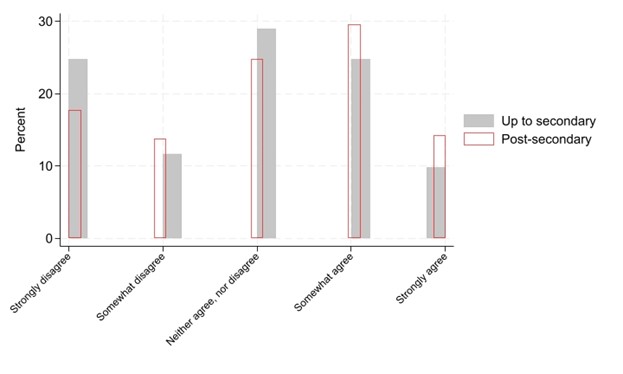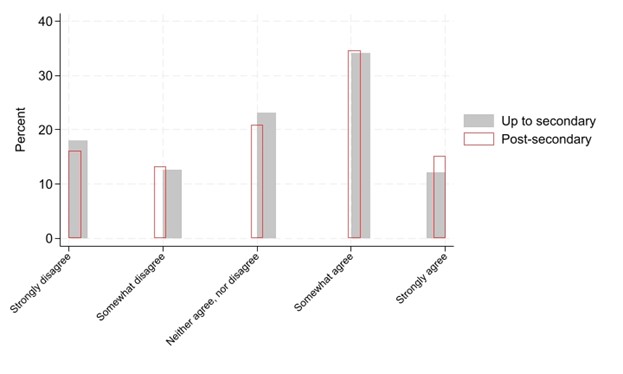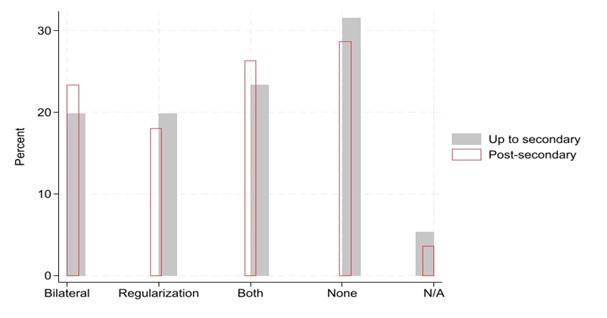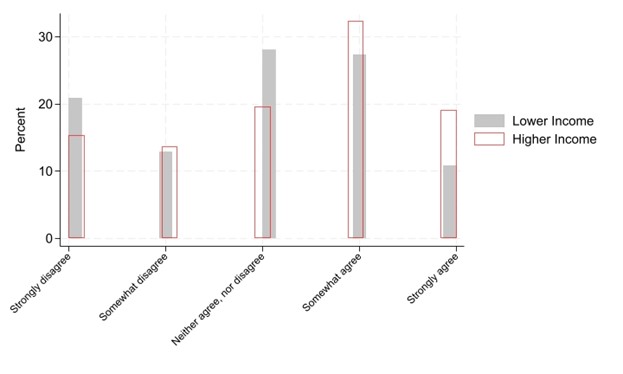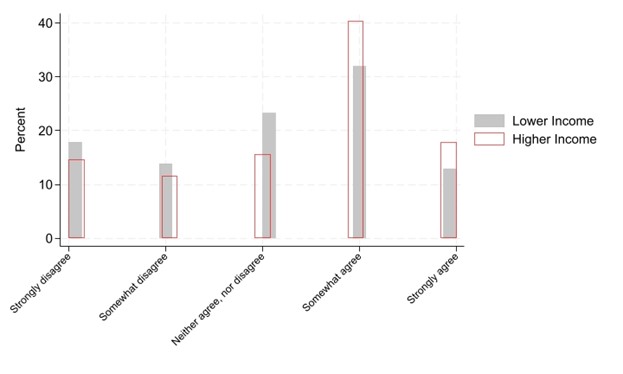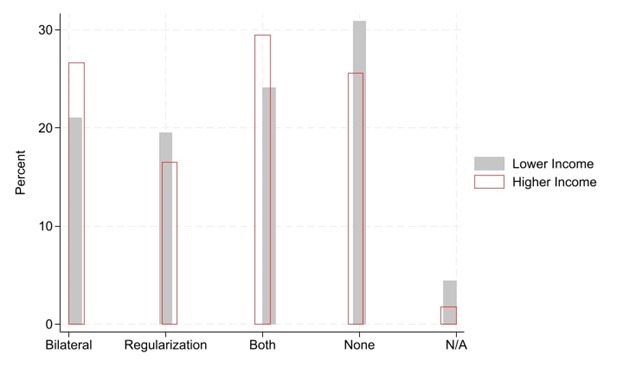- The Greek government announced its plans for the “legalization” of thousands of undocumented immigrants to address shortages in specific sectors of the labor market.
- This policy was presented as a realistic and immediate way to maximize the economic benefits of immigration while simultaneously curbing new migration flows, sparking intense reactions.
- Based on an online survey of a sample of 2000 Greeks, we find that Greeks prefer “legalization” policies over “bilateral agreements” that “sending” countries that would provide migrant labor for short periods on fixed-term visas
- Specifically, 40% of Greeks support such “bilateral agreements,” while approximately 50% support the “legalization” policy.
- A sizable percentage of the sample is neutral towards these policies (especially bilateral agreements) suggesting that these policies have not become polarizing issues.
- A minority of the sample (less than one-third) holds a strongly negative attitude towards immigration and would oppose any policy that appears to facilitate migrants, even if it addresses fundamental problems in the Greek economy.
- However, the overwhelming majority of respondents (almost 70%) would support at least one of these policies or both.
- Using an experimental technique known as a discrete choice experiment, data was collected regarding the preferences of Greeks for granting work permits to migrants based on profiles created using artificial intelligence, resembling typical migrants arriving in Greece.
- According to the analysis of 10,000 randomly generated profiles, Greeks prefer the legalization of migrants already in Greece without permits over immigrant guest workers who would come as a result of a new bilateral agreement.
- It is not clear that Greeks’ preferences take labor market shortages seriously into account in forming their immigration policy preferences.
- Concerns that the legalization policy may reward informality do not resonate in our sample and likely not in the majority of the Greek public.
Read here in pdf the Working paper by Nicholas Sambanis, Kalsi Family Professor of Political Science, and Director, Identity and Conflict Lab, Yale University, ELIAMEP Non-Resident Senior Research Fellow and Eleni Kyrkopoulou, Research Affiliate, Identity and Conflict Lab, Yale University and Postdoctoral Researcher University of Piraeus, Department of Economics.
IN SEPTEMBER 2023, Dimitris Keridis, who had been recently appointed Minister of Migration and Asylum in Greece, revealed the government’s plans to regularize thousands of undocumented migrants so as to address labor market shortages in agriculture, tourism, and construction (Ta Nea, 2023). Keridis highlighted the benefits of having migrant laborers transition from the informal to the formal sector of the economy, which would be a boost for public revenues while improving social order by curbing some of the comorbidities of illegality. Minister for Labor and Social Security Adonis Georgiadis supported the policy as one that reduces some of the threats that many supporters of his party typically perceive as arising from immigration. Georgiadis noted that immigrants who would be legalized would “pay [their] contributions, acquire pension rights, contribute to the insurance system, and reduce undeclared work. We secure legal labor without having to go abroad [and] without bringing [immigrants’] families from abroad” (Kathimerini, 2023). Keridis similarly pitched the new policy as one that is consistent with the goal of maintaining stricter control over Greece’s borders and reducing new inflows of immigrants (Ministry of Migration and Asylum, 2023).
Despite the fact that the legalization policy was presented as a realistic, hard-nosed way of maximizing the economic benefits of immigration while ebbing the flow of new migrants, opposition to the policy was registered first from the more conservative segments of the governing party (Financial Times, 2023). Antonis Samaras, former prime minister and ex-president of Nea Dimokratia, argued that the policy would in effect reward and encourage illegal immigration, turning Greece into “a beacon for attracting illegal immigrants” (Euro2day, 2023) whose identity could not be verified.
That opposition notwithstanding, the Greek parliament approved an amendment in December 2023 allowing the regularization of an estimated 30,000 undocumented migrants. The amendment is included in a draft law of the Ministry of Labor and Social Security (Article 187), which provides for the issuance of a residence permit with the right to access employment to third-country nationals who have a job offer, have resided in Greece until November 30, 2023 without a permit and continue to reside in Greece; and those who have completed at least three continuous years of stay in the country before submitting their application.
The political debate regarding the pros and cons of the new policy has taken place almost entirely at the elite level and it is not clear where Greek public opinion stands on this important issue. It is also not clear if the most vocal elites are actually representing large segments of the Greek public. The more uncertainty there is about public opinion, the easier it becomes for elites with strong preferences on a given issue to distort the policy-making process. To help reduce misperceptions regarding Greeks’ preferences on this important dimension of the government’s immigration policy, we decided to measure Greek public opinion using novel survey research methods that shed light on the public’s preferences regarding the proposed legalization policy. Our results may surprise some readers.
Method & Descriptive Findings
In February 2024, we contracted with MRB Hellas to field an online survey of a sample of 2,000 Greek adults who were fairly representative of the population with respect to their gender, age, and place of residence. Our sample was 48% male and 52% female and 42 years old on average. All respondents were Greek citizens without an immigration background. The fact that the survey was conducted online naturally means that our sample is not completely representative of the Greek population, since people over the age of 70 and those with very low educational attainment are unlikely to participate in online surveys. Nonetheless, we correct (re-weight) the sample for age imbalances with respect to the benchmark of the 2011 census as well as imbalances in region of residence or educational attainment and we control for other sources of preference heterogeneity in the sample (e.g. respondents’ self-placement on the left/right political ideology spectrum). Thus, overall, our findings should not be significantly different from those that would be obtained by analyzing a truly representative sample of Greeks.
Our survey instrument described the new immigration “legalization” policy to respondents and asked them to tell us whether (and how strongly) they agreed or disagreed with the policy. We also asked them to do the same with reference to an alternative policy which promotes signing bilateral agreements with “sending” countries that would provide migrant labor for short periods on fixed-term visas similar to guest worker programs in other countries. Subjects were told that these policies were motivated by substantial labor shortages in specific sectors, such as agriculture, and we explained that migrant workers who were part of the bilateral treaty programs would receive 9-month work visas for the explicit purpose of working in a given sector and that after the expiration of that period they would be obligated to return to their home country. Thus, subjects understood the two policies –legalization and bilateral treaties – as different ways to address labor market needs. Their preferences for one policy over the other could reflect their attitudes toward immigration more generally, but also their attitudes toward “law and order” issues since legalization has been interpreted by conservative politicians as indirectly rewarding immigrants’ prior illegality.
We asked respondents to tell us if they agreed or disagreed with each of these policies, one after the other, randomizing the order in which they saw our description of each policy. The results are telling: 40% of Greeks support bilateral agreements and around 50% Greeks support the legalization policy. These results are based on summing percentages of respondents who agree or somewhat agree with each policy, and they are shown graphically in Figures 1 and 2. In each of those figures, the left-side panel reports results using the raw data while the right-side panel includes population weight-adjusted data. A sizable percentage of the sample is neutral toward these policies (especially the bilateral agreements) so it appears that these policies have not become polarizing issues.
Figure 1: How much do you agree with bilateral agreements?
Notes: We asked “Due to substantial labor shortages in specific sectors, such as agriculture, the Greek government has attempted to forge bilateral agreements with third countries to receive migrant workers. For example, the Greek government is negotiating with the Egyptian government to thousands of Egyptian workers for a 9-month period in agriculture. After these 9 months, the workers would be obligated to return to Egypt. Do you agree or disagree that the government should pursue such bilateral agreements?” N= 2,007 respondents.
Figure 2: How much do you agree with regularization?
Notes: We asked: “In December 2023, the Greek parliament approved an amendment granting undocumented immigrants residence permits with work rights for a specified duration. To qualify, immigrants must meet specific criteria. This change is expected to benefit thousands of agricultural workers, addressing labor needs in the sector. Do you agree or disagree that the government should pursue this new labor market policy?” N= 2,007 respondents.
The results shown here reveal that a minority of our sample (less than a third) holds very negative attitudes toward immigration and would oppose any policy that appears accommodating toward migrants – even if it addresses core problems in Greece’s economy. Yet the majority of Greeks have a more pragmatic perspective and a very large share of citizens (about 50%) support the regularization policy. Indeed, in another question (results not shown here) we asked respondents which of the two policies they prefer –legalization or bilateral agreements– and we gave them the option to say that they prefer both or neither. We found that the vast majority of respondents (nearly 70%) would prefer at least one of these two policies, or both. Our research clearly shows that Greek citizens see immigration as a solution to labor market shortages and, therefore, appreciate the positive effect of immigrants on our economy – a finding that is often lost in extant studies of Greek public opinion which typically report overly negative public attitudes toward immigration.
Experimental Results
One possible concern with descriptive results such as those presented above is that survey respondents answer these questions without taking other factors into account, yet in real life the costs and benefits of the legalization policy may be evaluated in light of other factors, such as the specific economic sector where immigrants will work, the immigrants’ country of origin, or the “social distance” between the migrants’ culture and Greek culture. All of these factors may influence one’s judgement about an immigrant’s employment prospects as well as their likely social impact on Greek society. For example, migrants with children place more demands on the school system and on the social safety net than unmarried migrants; and migrants with high levels of skill and language ability might have better employment prospects than others.
Using a novel experimental technique known as a discrete choice experiment, we are able to account for all those factors while collecting data on what type of immigrant Greeks would prefer to grant a work permit to. In that richer context, which allows us to manipulate information about immigrant profiles experimentally, we can test again whether Greeks would prefer to give work permits to immigrants who are currently living in Greece without a permit (i.e. “illegal immigrants”) or immigrants who would come to Greece from their home country as part of a bilateral agreement as a guest worker. This method has several other advantages. It has been shown to produce more truthful estimates of the public’s true preferences when discussing sensitive topics; and it obscures the researcher’s true interest since the questions about legalization vs bilateral agreements are in a sense “hidden” within a broader comparison that mentions several other factors that respondents are asked to take into consideration.
The “discrete choice” experiment is based on creating profiles of hypothetical immigrants, such as the ones that we show in Figure 3 below. A methodological novelty in our study is that these profiles combine a list of attributes with visual material –pictures of migrants– that are generated by new Artificial Intelligence software. AI-generated pictures of males and females were created to look like typical people from countries in the Middle East, South Asia, or Africa and who therefore look similar to the typical immigrants who arrive in Greece from these regions. We then randomly varied the values of other attributes, including these people’s region of origin, language ability, prior work experience, and other factors. A typical profile pair is shown in Figure 3. The precise wording for this survey item is shown in the Appendix. Our main focus in this analysis was to measure respondents’ preferences over immigrants who were already living in Greece without a permit vs immigrants who were waiting to travel to Greece on the basis of a new bilateral agreement. In our framework, these preferences were measured while taking into account a fully randomized set of attributes, which made this choice more realistic and more complex than the survey items presented in the previous section. Each respondent saw five pairs of immigrant profiles and each time selected one immigrant who would receive a work permit. Because the choice was forced, respondents revealed even weak preferences in favor of one or some of the attributes of these profiles.
Figure 3: Discrete choice experiment
Notes: Each respondent made 5 such choices. Response was forced so the respondent had to choose between individual A and individual B.
What did we find? According to our analysis of 10,000 such randomly generated profiles, Greeks have a strong preference in favor of legalizing migrants who are already in Greece without a permit rather than those who would come as a result of a new bilateral agreement. This result affirms the descriptive findings presented earlier. Although our results might seem unexpected given the ferocity of political opposition to the legalization policy, supporters of the policy should be reassured by our findings, though some questions remain regarding the characteristics of subgroups of the population who have stronger or more negative views of that policy (we address this issue in the appendix).
Our experiment generates a number of other results, some of which are straight-forward: migrants’ language proficiency is hugely important, women are preferred over men, married people with children are preferred over people without kids or unmarried migrants, and Christians are preferred over Muslims. While these findings are in line with our prior expectations and seem fairly consistent with similar studies conducted in other European countries, there is at least one surprising result. We find that Greeks’ preferences over which migrants should receive work permits do not take into consideration the fit between migrants’ prior work experience on the one hand and underlying needs in the labor market on the other hand. For example, it is not the case that migrants with prior work experience in agriculture or farming are preferred over others, even though respondents had been told earlier in the survey that Greece faces labor shortages in agriculture. Migrants with prior experience in the hospitality industry (e.g. those who had worked as waiters previously, either in Greece or in their countries of origin) are less preferred than other professional categories despite well-known needs for staffing in the tourism industry. We note strong preferences for doctors, but this does not reflect preferences for high-skilled labor more broadly, since computer programmers are not preferred while home health aides and home cleaners are strongly preferred.
Thus, while our experimental results are consistent with descriptive results shown earlier, it is not clear that Greeks’ preferences take labor market shortages seriously into account in forming their immigration policy preferences. We do not have data on the geographic location of demands for migrant labor by sector, so it is difficult to explore how these sectoral needs map on to respondent preferences. A plausible explanation for our findings is that the legalization policy is preferred because it promises to reduce new inflows of migrants, and might therefore appear as a better way to secure the border. While these underlying motives remain open to further investigation, what is clear is that any concerns that the legalization policy will reward illegality do not resonate with our sample and likely also with the majority of the Greek public.
References
Dianeosis. 2022. “What Greeks believe – Part A.” URL: https://www.dianeosis.org/research/ti-pistevoyn-oi-ellines-2022/ [Accessed 2/21/24]
Euro2day. 2023. “Samaras against the government: It legalizes undocumented immigrants who have been in Greece for three years.” URL:https://www.euro2day.gr/news/politics/article/2223134/epithesh-samara-sthn-kyvernhsh-nomimopoiei-lathrom.html [Accessed 2/21/24].
Financial Times. 2023. “Greece’s legal migration plans splits its ruling party.” URL: https://www.ft.com/content/3efe3b9a-9fd7-4a79-862a-5729de53e66a [Accessed 2/21/24].
Kathimerini. 2023. “Amendment for Immigrants: Tuesday’s Vote, Samaras’ Reaction, and the Position of Maximos Mansion.” URL:https://www.kathimerini.gr/politics/562789237/tropologia-gia-metanastes-i-psifoforia-tis-tritis-i-antidrasi-samara-kai-i-stasi-toy-maximoy/ [Accessed 2/21/24].
Ministry of Migration and Asylum. 2023. “The amendment for the – under conditions – employment of third-country citizens in Greece was approved by the Parliament with a broad majority of 262 votes –Statement by the Minister of Migration and Asylum, Mr. Dimitris Kairidis.” URL: https://shorturl.at/eiQWX [Accessed 2/21/24].
Ta Nea. 2023. “Samaras steadfast on immigration – New message from the Maximos Mansion.” URL:https://www.tanea.gr/2023/12/16/politics/anendotos-o-samaras-gia-tin-tropologia-neo-minyma-apo-to-maksimou/ [Accessed 2/21/24].
Supplementary Information for: “Legalization of undocumented migrants or fixed-term bilateral agreements with sending countries: What do the Greeks prefer?”
Description of the conjoint experiment
Below we include the wording of the discrete choice experiment, along with some programming notes which provide additional clarifications regarding the setup of the forced choice tasks.
The discrete choice experiment was introduced as follows:
“Now we will show you profiles of migrants who might already live in Greece without a permit or who would like to travel to Greece from their country to work and we will ask you to tell us which one you would give a work permit to.
These individuals differ on a range of characteristics. You will be shown information about two individuals at a time. After we show you their profiles, we will ask you to choose one of these individuals to whom you would give a work permit. You will make 5 such choices. We will not ask you why you choose one person over the other; we just want to know which person you would choose if you had to make a choice.
Please consider the two profiles shown below, and let us know which of these two migrants you would give a work permit to?”
Respondents then saw hypothetical immigrant profiles which consisted of a picture and some other information presented in a box as in Figure 3 in the main text. The following information was included:
- Picture: We randomized among AI-generated portraits of males and females, drawn with equal probability from a pool of 10 available pictures of each gender and region, subject to the constraint that no picture could be shown twice.
- Region of origin: We randomly selected among Africa; South Asia; Middle East.
- Previous work experience: We randomly selected among the following: Doctor; computer programmer; waiter; agriculture/farming; home health aide/cleaning.
- Language ability: We randomized among: Very good Greek and English; basic Greek/good English; no Greek/very basic English (subject to the constraint that someone who was listed as living in their country of origin could not speak Greek).
- Religion: We randomized between: Christian; Muslim.
- Marital Status: We randomized among: Married, 2 kids; married, no kids; single.
- Current residence: Respondents saw an attribute labeled “In Greece currently?” and we randomized between: In Greece, without a permit; In home country.
After the presentation of the two profiles, respondents were asked to choose, as follows:
“If you had to choose, which of these two people would you give a work permit to?
[Individual A/ Individual B]
- Descriptive Statistics
We show summary statistics for our sample in Table 1. While the sample is generally close to the population across most characteristics, we note a large discrepancy with respect to educational attainment in our sample vs the census benchmark. The fraction of participants with post-secondary education is high in our sample (78.6%) whereas it is low in the general population (26.6% in the 2011 census). Note that more updated census data is not currently available. (We anticipate the gap in educational attainment relative to our data, which was collected in 2024, to be smaller in the updated census.) This imbalance is common in online survey panels, where respondents have, on average, a higher level of educational attainment than the general population. We noted a similar pattern in a well-known published survey of Greek public opinion by Dianeosis (2022). The Dianeosis (2022) survey combines online and telephone interviews and is therefore better able to achieve representatives, yet the share of their respondents with post-secondary education is also high (61%).
Additionally, we note an imbalance in the raw data with respect to age distribution relative to the census benchmark as we have an under-representation of the age group above 55 years (18% of our sample is above the age of 55 vs 38% in the 2011 census). This imbalance is an inevitable consequence of online survey research in Greece due to low levels of computer literacy among the older generations.
In other respects, we are close to representativeness, including with reference to region of origin and political ideology, which we can compute on the left-right spectrum using self-reported support for political parties, and by comparing that data to the latest electoral results.
In light of the imbalances that we have identified, we report both raw and weight-adjusted data. Population weights are computed for age, gender, and education using the 2011 census benchmark. We also adjust by weights for population margins by geographical region (NUTS 1 level). Specifically, we construct weights for gender (male/female), geography (NUTS1 level), education level (pre/post- secondary), and by age group (17-39, 40-54, 55-90) using the 2011 census wave and we construct political affiliation weights (right/ center-right and left/ center-left) using the 2023 national elections.
Table 2 shows the distribution of party vote in the sample, and in the general population according to data from the 2023 Greek national elections. We note a slightly lower representation of New Democracy supporters compared to the most recent electoral results among those respondents who answered the survey item concerning party support. Overall, there is considerable reluctance in revealing party support information as approximately 20% of the sample chooses the “Do not know/no response” category. (The item is placed last on the survey.) Overall, when we aggregate support for parties on the left vs right, our sample approximates the results of the recent elections.
Table 1: Summary Statistics
| Variable | Obs | Mean | SD | Min | Max | Population |
| Female | 2,007 | 52.1 | 0.5 | 0 | 1 | 51.4 |
| Age: 17-39 | 2,007 | 42.2 | 0.49 | 0 | 1 | 36.8 |
| Age: 40-54 | 2,007 | 40 | 0.49 | 0 | 1 | 25.6 |
| Age: 55-90 | 2,007 | 17.8 | 0.38 | 0 | 1 | 37.6 |
| Post-sec. edu | 2,004 | 78.6 | 0.41 | 0 | 1 | 26.6 |
| Attiki | 2,007 | 37.1 | 0.48 | 0 | 1 | 35.7 |
| Voreia Ellada | 2,007 | 30.2 | 0.46 | 0 | 1 | 28.6 |
| Kentriki Ellada | 2,007 | 23.5 | 0.42 | 0 | 1 | 25.4 |
| Nisia Aig/Kriti | 2,007 | 9.1 | 0.29 | 0 | 1 | 10.2 |
| Right/Cent.right | 1,519 | 50.3 | 0.5 | 0 | 1 | 55.5 |
Notes: Population data for gender, age, education level, and geography are from Census 2011. Political orientation population data are from the 2023 Greek National elections. Post-secondary education includes: AEI Degree (University)/ Graduate degree (e.g., Masters, PhD)/ IEK/Vocational training or similar/ TEI Degree. Right/ Center-right includes: Elliniki Lisi, New Democracy, Niki, Spartiates, Partiotikos Sundiasmos, Dimiourgia Xana, Diktyo Ellinismou, Ethniko Komma Ellines, Fileleutheri Symmahia, Foni Logikis, Pnoi Dimokratias. Left/ Center-left includes: K.K.E, MERA 25, PASOK – Kinima Allagis, Pleusi Eleftherias, Syriza, Volt Greece, Antarsya, EPAM, Nea Aristera, OAKKE, Ecologists Greens, Prasino & Mov.
Table 2: Party Choice Statistics
| Preferred political party | Sample (%) | Population (%) |
| Nea Dimokratia | 33.94 | 40.56 |
| Syriza | 16.72 | 17.83 |
| PASOK – Kinima Allagis | 10.43 | 11.84 |
| K.K.E | 9.43 | 7.69 |
| Other | 6.47 | 3.09 |
| Elliniki Lisi | 6.41 | 4.44 |
| MERA 25 | 5.28 | 2.5 |
| Pleusi Eleftherias | 4.34 | 3.17 |
| Niki | 4.27 | 3.7 |
| Spartiates | 2.64 | 4.68 |
| Partiotikos Sundiasmos | 0.06 | 0.5 |
Notes: Population data from the 2023 Greek national elections (20.73% of respondents preferred not to answer). We removed these respondents and recalculated the percentages for those who opted to reveal their affiliation (so, for example, the 33.9% of those who support Nea Dimokratia are calculated relative to those who reveal their party affiliation/support in the sample, not the entire sample).
3 Subgroup analysis: Policy preferences by level of education, income, and political ideology
In this section, we show results sorted by educational attainment and income – two dimensions that prior literature has identified as important in shaping public attitudes toward immigration.
Figure 4 shows that more educated respondents are more likely than less educated respondents to support bilateral agreements, whereas those who have up to a secondary school education (Lyceum) or below are more likely to feel strongly against such agreements or be uncertain about them.
By contrast, Figure 5 shows that preferences for the legalization policy are not strongly correlated with respondents’ educational attainment level. When asked which of the two policies they would prefer – legalization or bilateral agreements – while being given the option to support both policies or none – respondents with higher levels of education were more likely to support both policies compared to less educated respondents who were more likely to support none of the policies (see Figure 6).
We provide a similar analysis by income level and note that here, too, there is some non-response in the survey. We code a binary variable indicating “high income” vs “low income” respondents, using an annual income of 20,500 as our threshold (36.42% of respondents are above that threshold). We show in Figure 9 that lower-income respondents are less likely to support any agreement whereas higher-income respondents are more likely to support.
Finally, in regression analysis (results available upon request), we explore the association between attitudes toward legalization policy or bilateral agreements on the one hand and demographic characteristics on the other hand while controlling for income, education, and political ideology. We find less support for the legalization support among voters of right/center-right parties and more support among higher-income respondents though we note that controlling for these characteristics restricts our sample by approximately 40% due to missing data. This analysis is exploratory and descriptive, but it does show that most of the opposition to the legalization policy comes from the right wing of the political ideology spectrum. Overall, these results point to interesting dimensions of public opinion that can be further explored with our data, including associations between support for “law and order” norms on the one hand and the legalization vs bilateral agreement policy on the other hand. These extensions, as well as others that pertain to perceptions of the cultural differences between immigrants and native Greeks and how they affect respondents’ immigration policies, are the subject of other work conducted by the authors and results are presented elsewhere.
Figure 4: Preferences for bilateral agreements, by education level
Figure 5: Preferences for regularization, by education level
Figure 6: Policy choice, by education level
Figure 7: Preferences for bilateral agreements, by income level
Figure 8: Preferences for regularization, by income level
Figure 9: Policy choice, by income level




